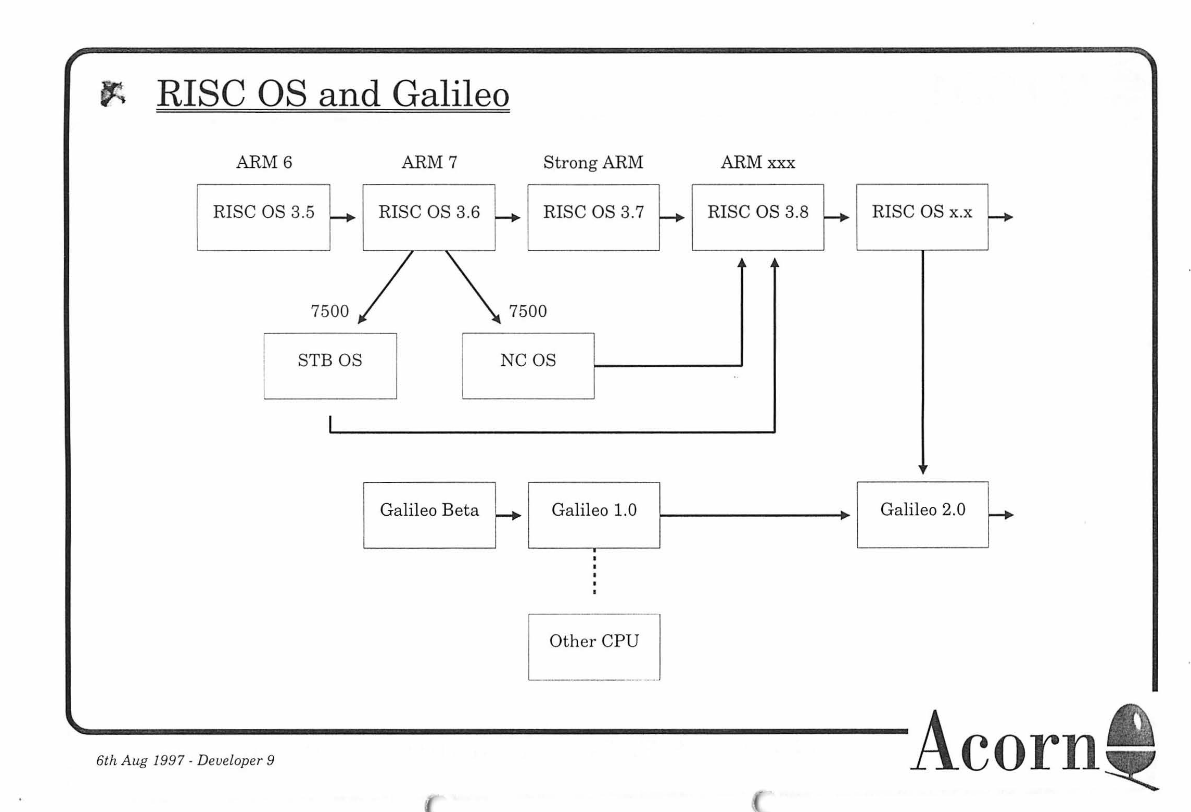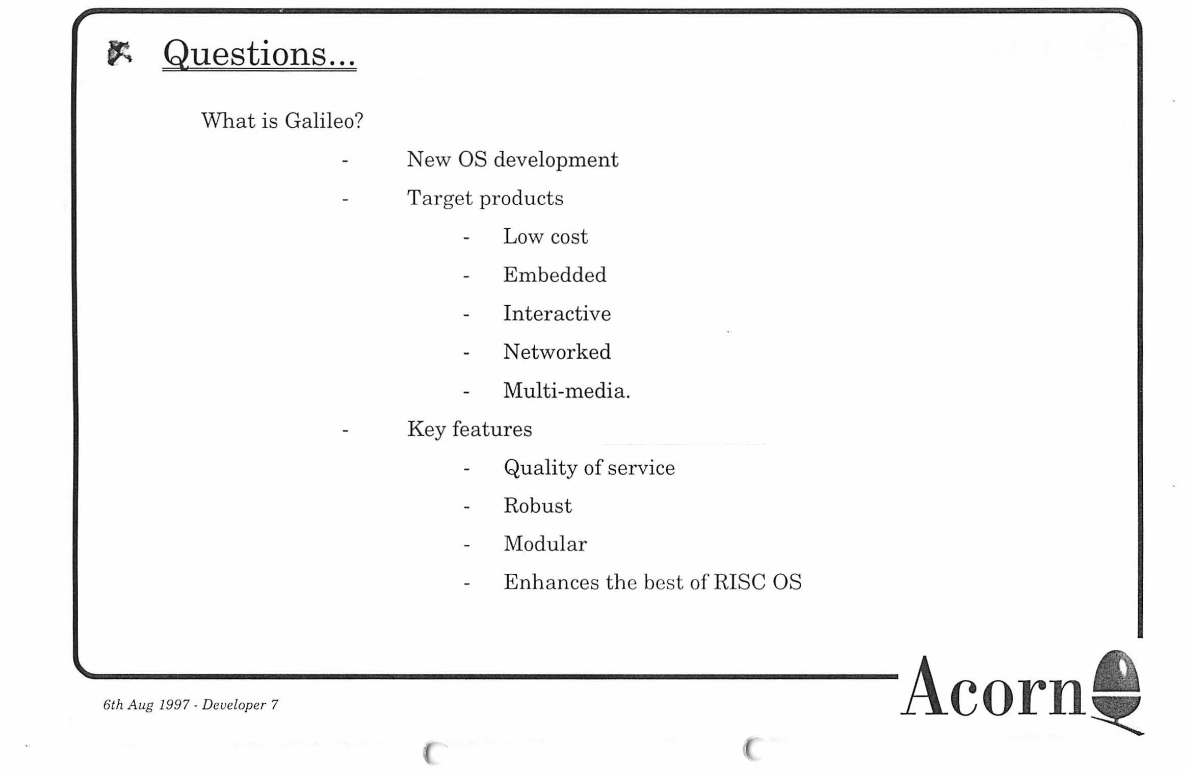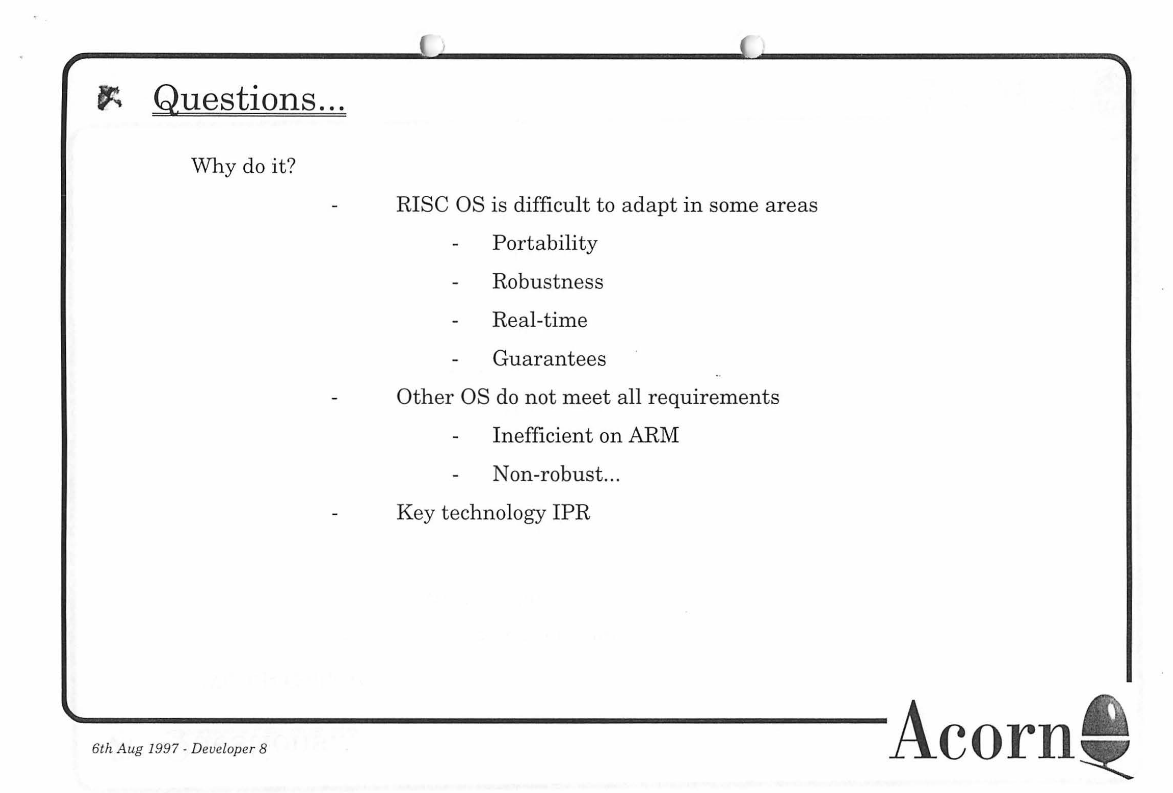Acorn historical wishlists (1997-1998)
|
|
Digging through the archives again I found a couple more documents that people might find interesting. Both these relate to the Phoebe era in 1997-1998. First is list of things that could be updated in RISC OS for Phoebe, a large amount of these were done for RISC OS 3.80 (that end up in RISC OS 4 and 5), some have been done in RISC OS after that, and some have not been done at all. http://www.4corn.co.uk/archive/misc/risc-os-proposals-1997-redacted.txt Second is a discussion of what programs should be included on the Phoebe Hard Disc distribution. It is interesting to see what was considered important for a home machine in 1998. http://www.4corn.co.uk/archive/misc/phoebe-hd-contents-meeting-1998-redacted.txt |
|
|
Oh? So that’s not the same SpriteExtend that choked on progressive JPEGs? ;-) They were increasingly popular on the ’net (even back then) and often required jpegtrans to convert into something RISC OS friendly.
ROTFL.
This, actually, would be pretty useful.
Noooo! We’ve had WaveSynth-Beep and StringLib-X since Arthur! They’re staples, like “with beans” or “with gravy”. Changing them is cataclysmic.
Or just delete it.
🤦
Aaand… What were we discussing just the other day? |
|
|
Interesting that they seriously aimed for Galileo, even expecting it to apparently arrive in the near future – I never thought it was much beyond “a glimpse of hope for the far and distant future”. Does anyone know what the driving force for Galileo was? NCs? STBs? Surely not the “enthusiast market”? |
|
|
Or 2002 in RISC OS 4 :-( See also the comments about cut+paste in icons, which wasn’t done until this year. |
|
|
In Aug 1997 it was seen as after the release of the OS after 3.8/4.0, so probably a few years. However it was required for Phoebe long term development, Phoebe was a multi ARM CPU machine and (covers Jeffrey’s ears) no one at Acorn was nuts enough to try to bolt that support onto RISC OS.
Looks like initially targeted at embedded (though not micro-controller) real time applications in internet appliances.
|
|
|
Galileo was being mostly developed by Sunil Kittur according to this interview with Acorn’s David Walker - Sunill’s LinkedIn Resume shows that he now works at Apple, but has done loads of Kernel development during his career. Maybe someone should try and arrange and interview and get the lowdown (and source code if there is any!) |
|
|
@ Alan
That would be awesome! :) |
|
|
About a year before Acorn closed down I remember Peter Bondar saying at a dealer day, that Acorn were contractually committed to shipping Galileo within a year. I wonder who the customer was. It sounds like it got less than half done, otherwise I’d expect to have heard of plans to complete. Edit: Having now read the David Walker interview it sounds like the Galileo Kernel was more complete than I thought. I wonder why no one took it on. |
|
|
@ Chris
Sounds like it was someone interested in embedded systems or early/experimental forms of IoT or mobile computing. From the interview it becomes clear what Galileo main goals were according to David Walker:
And again on the interview:
|
|
|
Interesting to see that they were going to negotiate to include Organiser to replace Alarm. Also that Spectrum and Amstrad CPC emulators could have been included. |
|
|
With application directories we have the possibility to get an excellent integration of old titles under RISC OS. ROS 5, the perfect retrocomputing platform? |
|
|
I think that is a very long way off. Between perfect emulation distributions e.g. for the Pi, the FPGA-based platforms for the cycle-exact recreation including analogue CRT experience like MIST and MISTer and very fast PCs for the big things like MAME or newer consoles, where’s the place for RISC OS? |
|
|
One could suggest that the OS itself is the retrocomputing platform. <🦆🦆🦆> |
|
|
Perfect emulation of all old versions of RISC OS would certainly be a worthwhile target. Start with RISC OS 3.1 and RISC OS 3.7, with good desktop integration like host fs and networking this would help to ease the constant pain of not-exactly-100%-backwards-compatibility over the decades. But I forgot ADFFS, which is probably the perfect retrocomputing environment for nearly all RISC OS games. But I fear the number of people desperately waiting for that is not very high. |
|
|
For me “perfect” is for integration (not quality of emulation). With application directories, one can use an emulated game as a native one. Sometimes I even forget that the game I’m using is not a native one. Integration could be even better, of course. |
|
|
ADFFS can do that, David. |



